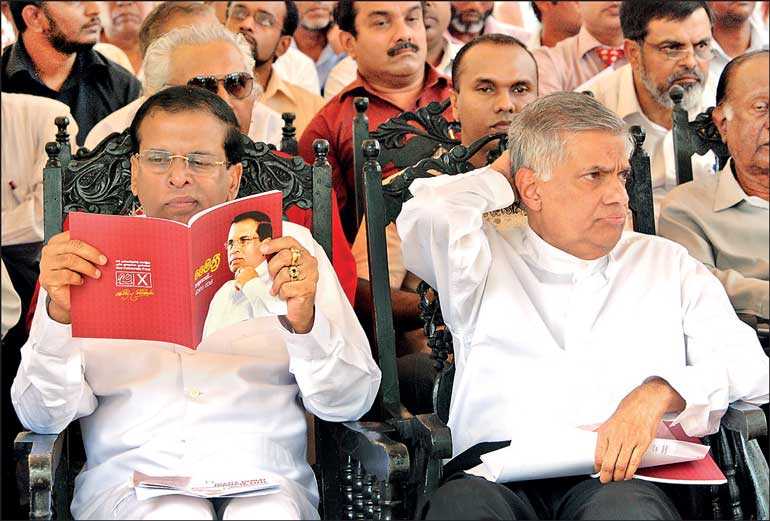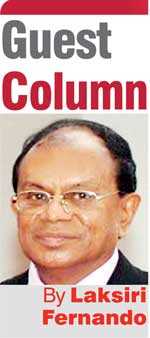Sunday Feb 22, 2026
Sunday Feb 22, 2026
Saturday, 24 August 2019 00:10 - - {{hitsCtrl.values.hits}}

Political determination for democratic reforms was weak from the beginning of the Wickremesinghe regime. Personal, ideological, and social/class cleavages emerged between the President and the Prime Minister – Pic by Shehan Gunasekara
 In politics there are no absolute truths, rights or wrongs: all is relative. Politics is about choices and alternatives. It is also the art of the possible. The best policy for the people is to work through the given alternatives and keep vigilant about deviations from accepted norms, principles, and treasured values. The major hurdle for Sri Lanka at present is the forthcoming Presidential Election (hopefully), to be held in November or early December. Jumping into further anarchy, or out of anarchy is the key challenge.
In politics there are no absolute truths, rights or wrongs: all is relative. Politics is about choices and alternatives. It is also the art of the possible. The best policy for the people is to work through the given alternatives and keep vigilant about deviations from accepted norms, principles, and treasured values. The major hurdle for Sri Lanka at present is the forthcoming Presidential Election (hopefully), to be held in November or early December. Jumping into further anarchy, or out of anarchy is the key challenge.
Sri Lanka has evolved into a reasonable democratic system, where people have the opportunity to elect their representatives to various bodies of governance - local, provincial and national, although the present and the past regimes have postponed or distorted many of them. The local council system goes back to the ancient times (as Gam Sabha), while many other present day democratic norms are assimilated (sometimes distortedly) through other (Western) democratic systems. Even the provincial council system has some semblance of ancient Rata Sabhas, although those were not elected bodies. These are mentioned here because the traditions and roots are important to the people, although some sections of the elite might try to discard them blatantly.
Importance of island-wide Presidential Election
Under the present system, people also have the opportunity, as a broad-based republic, to elect their Head of State as President, organised as a single electorate. This is important. This can be considered important not only for democracy, but also to unite the people as much as possible as ‘one country’ and ‘one civic nation,’ irrespective of ethnicity or religion, although the powers and functions of the President are of some controversy today. Even in Australia, those who advocate for a future Australian republic consider the advantages of an elected president. Uniting the country or the nation through presidential leadership might not happen in the immediately future, but the trends might evolve in that direction, whoever the next President will be. Sri Lanka cannot survive or thrive otherwise.
The Westminster system is what the country inherited as colonial heritage at Independence. There are people who consider that system to be sacrosanct, and suitable to Sri Lanka in toto. This system existed almost purely until 1972, but the First Republican Constitution then made some adjustments to make it a more popular democracy, based on some socialist views. Unfortunately, it survived only for six years. When the Presidential system was introduced in 1978, it was opposed, as it entailed not populist but authoritarian characteristics. The LSSP, its leader N. M. Perera and other Left parties were in the forefront of that opposition. But the present LSSP or the Communist Party does not appear to oppose a popular/socialist presidential system, based on the people and democracy. What NM strongly opposed was the JR constitution and UNP manipulations.
Since 1994, almost all parties and leaders promised to abolish the presidential system, but didn’t do so for one or the other reason. Power in the presidency that leaders cherished was one reason. The spread of presidential systems in the international scene was another. Views of the parties and leaders also changed due to some other experiences. After the devolution of power, presidential position was considered a necessity. In countering terrorism, the merits of the presidential system also became highly appreciated. People more or less got used to the system, and appreciated it based also on the traditional ‘kingship mentality.’
Since 1994, almost all parties and leaders promised to abolish the presidential system, but didn’t do so for one or the other reason. Power in the presidency that leaders cherished was one reason. The spread of presidential systems in the international scene was another. Views of the parties and leaders also changed due to some other experiences. After the devolution of power, presidential position was considered a necessity. In countering terrorism, the merits of the presidential system also became highly appreciated
Betrayal of 2015 political change
However after the 18th Amendment, there was a new impetus to abolish the presidential system. People also wanted to change the Rajapaksa regime, which was a positive sign. People have and should have every right to change governments, and to expect progress as they want. Political change in 2015 was a major result of this trend, although it is not at all achieved. Instead of abolishing the presidential system, for example, what we have is a pathetic duality or ‘diarchy’, which in fact has created an anarchy. In constitutional terms, this is the end result of the 19th Amendment.
However, the situation is not purely constitutional, but political. Political determination for democratic reforms was weak from the beginning of the Wickremesinghe regime. Some economic imperatives predominated politics, influenced by foreign ideologies like neo-liberalism. Instead of eradicating corruption, new forms of corruption emerged from the very beginning. Personal, ideological, and social/class cleavages emerged between the President and the Prime Minister. The Government appeared very foreign to the people, and even to the UNP grassroots members. This why there is an internal rebellion today within the ruling UNP. Foreign agendas predominated and national security was neglected.
Constitutions may be interpreted legally, but cannot be understood without politics. Constitution makers, particularly in countries like Sri Lanka, create ambiguous provisions due to incompetence, by purpose, or because of compromises on divergent interests. In the future, ‘artificial intelligence’ might better be used for coherent constitution-making. Most of the constitutional amendments to the present Constitution are motivated by personal and narrow political agendas. The 19th Amendment is no different, and considering what people expected, it is apparently one of the worst of its kind. It has created an anarchy, first manifested in the constitutional crisis of October 2018, and then eventually leading to the Easter Sunday terrorist attacks this year. This is an anarchy that some foreign forces apparently want in Sri Lanka.
A mistaken analysis
In a recent article titled ‘The Presidential Election – Sleeping Walking Into Anarchy’ (Colombo Telegraph, 17 August 2019), Dr Nihal Jayawickrama has argued that the 19th Amendment has reduced the President into purely a ceremonial office, and therefore asks why squander billions of rupees in an island-wide election to choose the next President? At this last moment, he is proposing a constitutional amendment to thwart the Presidential Election and elect a new President from the existing Parliament or an Electoral College! Of course there are many elite groups who are against island-wide or even local elections, although they may talk about democracy. I wonder whether any of these people, including Jayawickrama, raised any objection when billions of rupees were robbed through bond scams under the Wickremesinghe regime.
Jayawickrama of course has been careful to admit that the current President entertains executive powers, but claims that those interim powers would end after President Sirisena. This is not at all the case. A President entertains political and moral power, as he/she is elected by the people. People and other people’s representatives (MPs) should be vigilant however not to allow Presidents to exceed them. This was the mistake before 2015. If there are other inhibitions on those powers, they are determined by the lack of majority support in Parliament under a given condition, in addition to what is written.
The Constitution still contains Presidential powers, what can still be called executive powers, but reduced in many areas under the 19th Amendment, both beneficial and harmful. One of the fundamental articles of the Constitution, Article 4 (b) clearly says, “The Sovereignty of the People shall be exercised and enjoyed in the following manner :– …. (b) the executive power of the People, including the defence of Sri Lanka, shall be exercised by the President of the Republic elected by the People…”
The above is not changed by the 19th Amendment. This is about the sovereignty of the people, which cannot and should not be changed without a Referendum. Article 4 is linked to and flows from Article 3 of the Constitution. ‘Who cares for the sovereignty of the people’ or a Referendum might be one of the elitist arguments. Obviously, some people have different notions quite foreign to the country, to the people, and to the Constitution.
Sri Lanka cannot remain in constitutional ambiguity. The UNF Government was reluctant to go before the people for a Referendum to change the presidential system. This is what has created an anarchy, and the change of which might come through the next Presidential Election. Jayawickrama has ridiculed both Gotabaya Rajapaksa and Sajith Premadasa in his article, without mentioning their names, for coming forward as presidential candidates. Both candidates appear to have similar determination in contrast to Ranil Wickremasinghe or Karu Jayasuriya. In ending the present anarchy however, one of them should not only win the presidency but should manage to win a majority in Parliament.
If, and only if, Sajith Premadasa is selected as the candidate of the UNP and of the broader UNF coalition, Sri Lanka might evolve in a direction where the two major political forces (also others) could forge relative consensus on important issues, in contrast to what appears as the extremely divisive, manipulative, narrow, and extensively foreign-aligned present regime of Wickremesinghe, which has completely betrayed the aspirations of the 2015 change. If they fail, the JVP and the Left parties, with the assistance of the people’s democratic forces, should be ready to take the battle further. The immediate task however is to overcome the present anarchy in a democratic fashion, and also changing the economic policy direction.
Sri Lanka has evolved into a reasonable democratic system, where people have the opportunity to elect their representatives to various bodies of governance - local, provincial and national, although the present and the past regimes have postponed or distorted many of them. The local council system goes back to the ancient times (as Gam Sabha), while many other present day democratic norms are assimilated (sometimes distortedly) through other (Western) democratic systems. Even the provincial council system has some semblance of ancient Rata Sabhas, although those were not elected bodies